
Vestnik Moskovskogo universiteta. Seriya 10. Zhurnalistika
Scope & Guideline
Advancing the Dialogue in Journalism and Communication
Introduction
Aims and Scopes
- Multimedia Journalism:
Research related to the evolution and typology of multimedia formats in news publications, addressing how digital platforms are reshaping journalistic practices. - Pragmatics and Communication:
Investigations into the pragmatic aspects of communication in journalism, including the interaction between media brands and their audiences, as well as the role of speech models in media communication. - Cultural and Historical Contexts:
Exploration of the historical development of journalism in various contexts, including studies on media representation, folklore, and the impact of historical events on media narratives. - Impact of Technology on Journalism:
Analysis of how technological innovations influence journalism, including the use of artificial intelligence and changes in media consumption patterns in the digital age. - Social and Political Dimensions:
Examination of the social and political implications of media practices, including the representation of social movements, public diplomacy, and the role of journalism in shaping public opinion. - Educational Perspectives:
Studies focusing on journalism education, including the training of future journalists and the evolving professional roles within the industry.
Trending and Emerging
- Artificial Intelligence in Media:
There is a growing interest in how artificial intelligence is being integrated into journalism practices, exploring both its benefits and challenges for content creation and dissemination. - Digital Media Consumption Patterns:
Research focusing on the consumption habits of audiences in a high-choice media environment is trending, reflecting the changing dynamics of how news is accessed and interacted with. - Social Media's Role in Journalism:
The impact of social media platforms on journalism, including their influence on news dissemination and audience engagement, is a rapidly emerging area of study. - Pragmatic Communication in Journalism:
An increasing focus on the pragmatic aspects of communication, particularly how media brands interact with audiences and the implications for media trust and credibility. - Crisis and Conflict Reporting:
Emerging themes related to the media's role in crisis situations, such as the COVID-19 pandemic, highlight the need for nuanced reporting and the ethical responsibilities of journalists.
Declining or Waning
- Historical Journalism Studies:
There appears to be a waning focus on historical analysis of journalism, particularly studies related to earlier periods of Russian journalism, as contemporary issues gain more attention. - Traditional Media Analysis:
Research that solely emphasizes traditional media formats, such as print journalism, is becoming less frequent as the focus shifts towards digital and multimedia journalism. - Local Journalism Studies:
The exploration of local journalism and its specificities is diminishing, possibly due to a broader interest in global media trends and digital platforms. - Theoretical Frameworks in Journalism:
There is a noticeable reduction in articles that delve deeply into theoretical frameworks of journalism, suggesting a shift towards empirical studies and practical applications. - Gender and Media Representation:
The frequency of studies specifically addressing gender issues within media representation has decreased, indicating a potential shift towards more generalized social issues.
Similar Journals
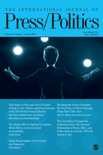
International Journal of Press-Politics
Driving Discourse on Media's Impact in Political LandscapesThe International Journal of Press-Politics, published by SAGE Publications Inc, stands as a premier scholarly platform at the intersection of communication, sociology, and political science. With a distinguished history dating back to its inception in 2003 and maintaining its relevance through 2024, this journal is recognized in the academic community for its rigorous exploration of the dynamics between the media and political processes. The journal proudly holds a Q1 ranking in both Communication and Sociology and Political Science categories, placing it in the top tier of its field, underscored by its impressive Scopus rankings, which reflect its global influence and reach. With an intention to foster innovative research and discourse, IJPP is committed to being accessible, contributing significantly to the understanding of how press and politics shape societal narratives, thus serving as an essential resource for researchers, professionals, and students alike. Explore this esteemed journal to engage with cutting-edge studies that drive the field forward.
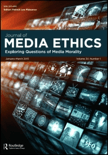
Journal of Media Ethics
Illuminating the Intersection of Media and Morality.Journal of Media Ethics, published by Routledge Journals, Taylor & Francis Ltd, is a pivotal platform for scholars and practitioners interested in the intersection of media, ethics, and communication. Operating since 2015, this esteemed journal has consistently contributed to the discourse on ethical frameworks in contemporary media practices, making significant strides in the fields of communication and philosophy. With an impressive Q2 category ranking in Communication and a Q1 category ranking in Philosophy as of 2023, the journal demonstrates its influence and relevance, achieving Scopus ranks that place it in the top 87th percentile for Philosophy and the 62nd percentile for Communication. Despite being a subscription-based journal, it caters to an interdisciplinary audience eager to explore the ethical dimensions of media in a rapidly evolving digital landscape. Researchers, professionals, and students alike will find valuable insights and innovative research within its pages, underscoring the importance of ethical considerations in framing media narratives.
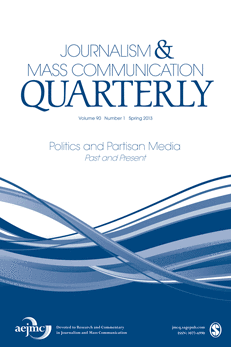
JOURNALISM & MASS COMMUNICATION QUARTERLY
Unveiling critical perspectives on today’s media landscape.JOURNALISM & MASS COMMUNICATION QUARTERLY, published by SAGE PUBLICATIONS INC, stands as a premier platform for scholarly discourse in the fields of journalism and mass communication. With an impressive Q1 ranking in the Communication category for 2023, this journal serves as an essential resource for researchers, professionals, and students seeking in-depth analysis and insights into contemporary media landscape challenges and evolutions. Its comprehensive scope, encompassing studies from as early as 1955 through 2024, provides a rich repository of historical and current research, ensuring a continuous dialogue about the impacts of media on society. Although not an Open Access journal, it remains highly regarded, evidenced by its Scopus rank of #41 out of 511 in the Communication field and a remarkable 92nd percentile ranking. As a critical resource, it contributes significantly to advancing academic knowledge and practical applications in journalism and mass communication.

Journalism and Media
Connecting Scholars and Practitioners in Media DiscourseJournalism and Media is a premier, peer-reviewed academic journal hosted by MDPI, dedicated to advancing knowledge in the fields of journalism, media studies, and communication. Established in 2020, this Open Access journal aims to facilitate the dissemination of high-quality research free of cost, promoting inclusivity and accessibility in academia. Additionally, it boasts a substantial reputation, reflected in its impressive Q1 rankings in both the Arts and Humanities as well as Linguistics and Language, and a Q2 category standing in Social Sciences (miscellaneous) for 2023. With Scopus rankings placing it within the top 15% of journals in its field, Journalism and Media not only contributes significantly to contemporary discourse but also provides an essential platform for interdisciplinary collaboration and innovation. Researchers, professionals, and students alike are encouraged to engage with the journal’s rich array of articles that explore the complexities of media dynamics, journalistic integrity, and the impact of technology on communication practices.
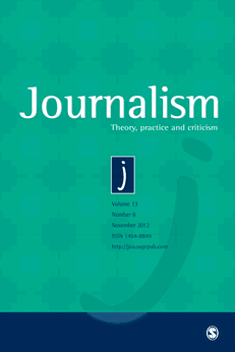
Journalism
Illuminating the Intersection of Ethics, Politics, and CommunicationJournalism is a leading interdisciplinary journal published by SAGE Publications Inc, renowned for its rigorous academic standards and impactful research. With an ISSN of 1464-8849 and E-ISSN 1741-3001, the journal has established itself within the top quartile of both the Arts and Humanities and Communication fields, boasting an impressive rank of 22nd out of 552 in Arts and Humanities (miscellaneous) and 35th out of 511 in Social Sciences (Communication) as of 2023. This journal, based in the United Kingdom, is committed to fostering scholarly dialogue surrounding journalism’s evolving role in society, covering a wide range of topics including media ethics, digital communication, and the impact of state and global politics on public discourse. Notably, the journal does not offer open access, enhancing its exclusive appeal to academics and professionals. With a focused scope that extends from 2000 to 2024, Journalism contributes to the understanding of emerging trends and challenges, making it an invaluable resource for researchers, practitioners, and students alike seeking to engage deeply with contemporary issues in the field.

Doxa Comunicacion
Elevating voices in the study of modern communication.Doxa Comunicación is a prominent open-access journal dedicated to advancing the field of communication studies, published by Universidad San Pablo CEU, under the Faculty of Humanities and Communication Sciences. Established in 2003, this journal has gained recognition for its commitment to disseminating high-quality research and thought-provoking articles, fostering a vibrant academic community. With an ISSN of 1696-019X and an E-ISSN of 2386-3978, Doxa Comunicación occupies a vital niche in the academic landscape of Spain, contributing to both national and international discourses. In the 2023 rankings, it is categorized in the Q3 quartile within the fields of Communication and Social Sciences (miscellaneous), reflecting its competitive standing among peer publications. The journal's diverse scope, including contemporary communication theories and practices, ensures relevance for researchers, professionals, and students alike. With a Scopus rank of #333 in Social Sciences (miscellaneous) and #291 in Communication, Doxa Comunicación serves as an essential platform for innovative research that addresses the complex challenges of modern communication in a rapidly evolving society.
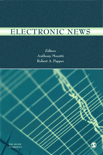
Electronic News
Empowering Academics with Cutting-Edge Media Research.Electronic News, published by SAGE PUBLICATIONS INC, stands at the forefront of scholarly communication, focused on the dynamic intersection of media, technology, and society. With an ISSN of 1931-2431 and an E-ISSN of 1931-244X, this journal has established itself as a valuable resource for academics and professionals alike, exploring critical themes in communication and information systems. Operating from its base in the United States, Electronic News operates within a competitive landscape, boasting a commendable Q2 ranking in Communication and a Q3 ranking in Information Systems. This reflects its commitment to high-quality research and impactful insights, as evidenced by its Scopus rankings, where it ranks #238 out of 511 in Social Sciences Communication and #302 out of 394 in Computer Science Information Systems. Although currently embracing a traditional subscription model, the journal serves as a crucial platform for disseminating knowledge that shapes the future of news and media in a rapidly evolving digital age. As it converges from 2009 to 2024, Electronic News continues to invite contributions that address the multifaceted challenges and innovations of news media, making it an essential resource for researchers, practitioners, and students eager to engage with contemporary issues in communication.
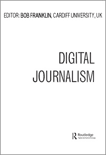
Digital Journalism
Navigating the Digital Landscape of Modern JournalismDigital Journalism is an esteemed academic journal dedicated to advancing the interdisciplinary field of digital communication and journalism. Published by Routledge Journals, Taylor & Francis Ltd, this journal has established itself as a leading resource with a noteworthy Q1 rank in Communication for 2023, placing it among the top tier of journals in this dynamic field. With its ISSN 2167-0811 and E-ISSN 2167-082X, it serves as a pivotal platform for researchers, professionals, and students interested in exploring the intersection of technology and journalism, publishing insightful studies that address contemporary challenges and innovations. The journal has been continually evolving since its inception in 2013 and is set to extend its reach until 2024, consistently attracting high-quality scholarly contributions. With a distinguished rank of 11 out of 511 in Scopus's Social Sciences - Communication category, and boasting an impressive 97th percentile, Digital Journalism is an essential read for anyone keen on understanding the future of news in the digital era.

Revista Comunicacao Midiatica
Cultivating Knowledge in the Realm of CommunicationRevista Comunicação Midiática is a prominent academic journal focusing on the fields of communication, media studies, and cultural dynamics, published by Universidade Estadual Paulista Júlio Mesquita Filho, Facility of Architecture, Arts & Communication. With its ISSN 2236-8000, this journal aims to disseminate innovative research, theoretical advancements, and practical insights that contribute to a deeper understanding of communication processes in contemporary society. Although it currently does not provide Open Access options, the journal serves as a valuable resource for researchers, professionals, and students who are keen to explore the intricate relationships between media and culture. Located in Bauru, Brazil, the journal is committed to fostering multidisciplinary dialogue and enhancing scholarly discourse, making it an invaluable addition to the academic landscape in the realm of media studies.
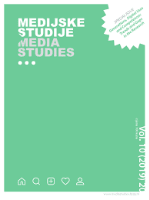
Medijske Studije-Media Studies
Empowering Voices in Media StudiesMedijske Studije-Media Studies, an esteemed journal published by SVEUCILISTE & ZAGREBU, FAK POLITICKIH ZNANOSTI, is a pivotal platform in the field of communication studies and media research. Established in Croatia, this Open Access journal since 2010 features a diverse array of research articles that explore the multifaceted relationships between media and society. With its ISSN 1847-9758 and E-ISSN 1848-5030, the journal serves an international audience and is committed to disseminating innovative insights that drive media scholarship forward. Currently ranked in the Q3 category in Communication and Q4 in Computer Science Applications for 2023, it reflects its growing influence, capturing vital trends and analyses that resonate in both academic and practical realms. The journal's Scopus rank sits at #337 out of 511 in Social Sciences_ Communication, placing it within the 34th percentile, thus establishing its relevance in the global discourse on communication. Researchers, professionals, and students are encouraged to engage with this resource as it continues to forge connections between media studies and contemporary societal issues.